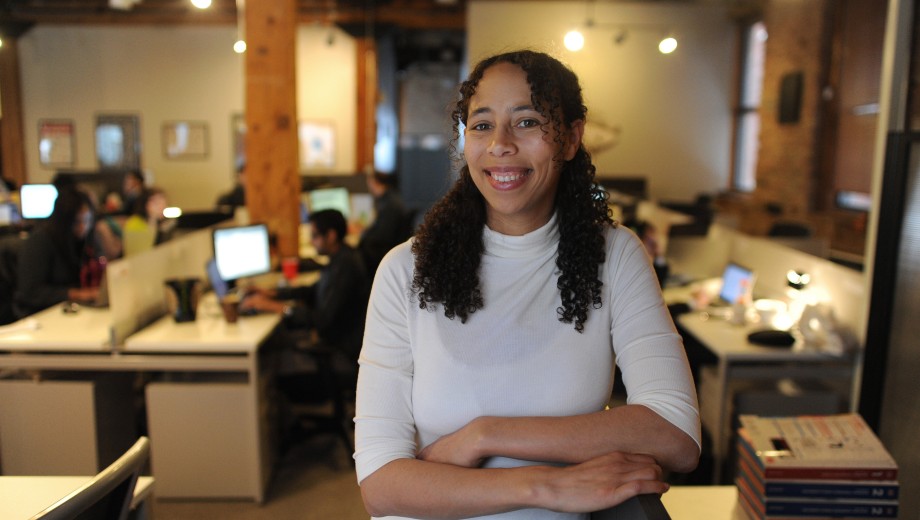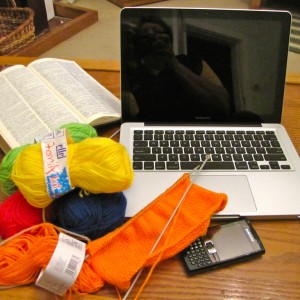When Jackie Reber was job hunting, she was struck by the job listing for Codifyd, a Chicago tech company. The firm expressed interest in humanities graduates, linguists in particular.
“Nobody asks for linguists,” says Reber, AM’07, PhD’11, who wrote her Linguistics dissertation about Creole language in Suriname. “Nobody knows what linguists do.”
As it turned out, the head of Reber’s division, Gina Bulatovic, AB’98, AM’03, PhD’08, is also a linguist who knew exactly what linguists could do for Codifyd. The consulting firm helps companies improve their websites and e-commerce presence by reorganizing and reclassifying the data they put online.
“The process reminds me a lot of work I did during my dissertation,” says Reber, an analyst. “You’re given a mass of data, and your job is to sort through all this information and organize it in a way that makes sense. It’s about organizing data to tell stories.”
Here, Reber and four other UChicago Humanities alumni offer thoughts about finding fulfilling careers in the tech sector.
The tech sector doesn't just need programmers or entrepreneurs.
Reber advises humanists to cast their nets widely when applying for jobs. “There’s a shortage of really talented people,” agrees Matt Percy, AM’98, a graduate of the Master of Arts Program in the Humanities (MAPH). Percy is director of strategy and business development for Microsoft in Redmond, Washington. “We’re super agnostic about where these people come from.”
“The tech community in general loves people who can think differently and who are really, really smart,” says Mary Carello Senic, AM’08, another MAPH graduate and a recruiter at Google’s headquarters in Mountain View, California.
The skills that students develop researching and writing about cinema or philosophy or eighteenth-century poetry do translate to the tech world.
“The secret of the tech industry is that it only works if there are lots of people who aren’t techies,” says Jon Aronoff, AM’95, vice president and distinguished analyst at the Research Board, a New York City think tank that is part of Gartner, the world’s largest information technology research and advisory company. “There are brilliant engineers out there, but they tend not to deal with human complexity that well,” he says. “The world that we live in requires the skills you get in humanistic education.”
By that he means research, writing, persuasive, and analytical skills. For example, Aronoff—who studied English in graduate school—might make recommendations to companies about how and whether to use an online file-storing service such as Dropbox. Where a financial analyst might evaluate the service’s cost-effectiveness, Aronoff would research and analyze the cultural context in which it exists: how and why people use it and whether those reasons are likely to exist in the future.
“When people are trained to analyze companies from a business school background, they tend to do it from a financial standpoint,” he says. “The way we’re looking at it isn’t actually that different from the skills you use learning to analyze poetry or breaking a film down shot by shot.”
The UChicago network is powerful: use it.
Codifyd is just one example of a UChicago grad hiring more alumni. Aronoff was the first UChicago graduate to join the Research Board, but thanks to his recruiting there are now seven on a research staff of 33. An alum interviewed Carello Senic for a position at Google several years ago; she wasn’t hired, but staying in touch ultimately paid off when she interviewed again last year and got the job.
First, of course, it’s important to reach out. “I think there are a lot of people who don’t put themselves out there enough,” Percy says. “I get a call from maybe one UChicago person a year.” If this story spurs more calls, he says, “that’s great.”
Stay connected to the humanities.
Carello Senic, who wrote her master’s thesis on the green building movement, still does architectural research in her free time and has volunteered with the National Trust for Historic Preservation.
Humanities training can help even when you don’t have a job. Before landing his current position as a product marketing manager for Facebook in Menlo Park, California—“a job I love”—Jeremy Galen, AM’07, had a few different tech jobs. Some were with start-ups, some not; some were full-time, some not, and he felt frustrated.
“I felt like I’d abandoned my vocation,” he says. What sustained him was creative writing—essays and fiction, including several book-length works—using the skills he’d honed in the MAPH program. He also started a blog of philosophical musings that he still maintains, which includes a defense of the idea of “overthinking” that would make any UChicago alumnus proud.
Percy, now at Microsoft, believes the intellectual approach he learned in graduate school informs everything he does, including his work on the company’s Xbox video games.
“I like to think the humanities is a huge part of who I am,” he says. “It’s really shaped the way I approach the world.”


